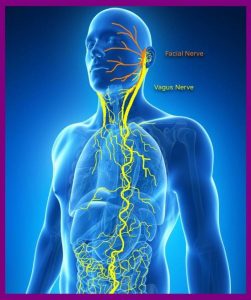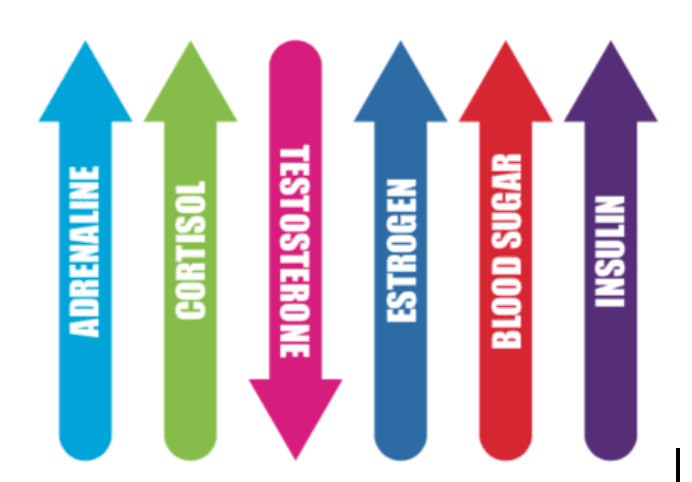How Does Your Body Handle Chronic Stress?
Your body is designed to handle stress, but does it handle chronic stress? Statistically, Americans have high rates of stress and anxiety. Moreover, Americans don’t care for themselves in the area of chronic stress.
General Adaptive Potential:
The nervous system mediates and modulates body responses. Stress is processed through the nervous system.
If the bandwidth of your nervous system is such that the stress can come in and can dissipate it, then the body will continue to function and thrive rather than go into defense physiology. It can continue to process those stressors and continue to grow.
But as we age, chronic stress sets in, we don’t eat right, and fail to steward our bodies well. The result is our general depth of potential starts to narrow. And as it starts to narrow, that stress could affect us MUCH more than we realize. Rather than being flexible, they break.
Over time, chronic stress or the constant little acute stressors we face, take our body into a sympathetic state. Even though we think stress is a mental health distress, your body is the first thing to let you know that you’re not ok. Chronic stress = chronic disease
Vagus Nerve + Sympathetic Nervous System:
When we’re under threat the sympathetic nervous system takes over. Within milliseconds of a threat, the first response of the body is in the amygdala. The vagus nerve which is directly connected to the amygdala drops out and it cannot keep the system in check. As a result, the sympathetic nervous system stays in the game, keeping us in fight or flight. As long as we are in this state, the activity of the vagus nerve is too low. It cannot check for infection or on the immune system. It is not online to keep our digestion working, or online to keep cancer cells under control.
Aa we talk about the impact of stress on our bodies, it’s not the Parasympathetic Nervous System at fault. It’s the fact that the vagus nerve is no longer keeping us healthy.
How Stress Affects the Body:
Researchers define stress as something that disrupts your feeling of mental balance or wellbeing. Stress activates a series of hormones that ultimately bring your body and mind back into balance.
When you experience stress, your body goes into “fight-or-flight…or freeze” mode. Your heart rate increases, breathing quickens, muscles tighten, and blood pressure rises. This keeps you alert and safe in the short term and subside after the stressful event. In other words, those stress hormones should do their job and then simmer down.
Here’s what happens. Only a small portion of the human brain (about 12%) understand the difference between reality and non-reality (the stuff you make up in your head). The other 88% of your brain doesn’t make that distinction. So when you have a stress reaction to money for example, 88% of your brain has no idea that you’re not in danger. So it turns on the “fight or flight or freeze”. As a result, the hormones associated with that system are working for no reason.

From Stressed to Depressed
Chronic stress leads to elevated hormones (e.g., cortisol) and reduced neurotransmitters (i.e., serotonin and dopamine). These changes are very similar to what occurs during a depressive episode. Therefore, it is not too surprising that long-term stress can ultimately lead to a depressive disorder. Furthermore, there is some evidence that chronic stress may actually “rewire” your brain. Specifically, research has demonstrated that animals exposed to chronic stress increases the strength of brain regions responsible for survival and handling threats, while weakening the prefrontal cortex. For humans the prefrontal cortex is responsible for planning, decision-making, problem-solving, self-control. Disruptions in these cognitive processes can have significant impacts on our daily functioning.
Where Does Chronic Stress Lead?
Stress can impact:
- Sleep quality
- Food choices (Read: the sugar binge)
Sugar impacts your:
- Mood &
- Increase chronic inflammation
Researchers believe inflammation is a major driver for:
- Mood disorders
- Depression
- Increased blood glucose levels
- Lower the Immune system
Chronic Stress Symptoms On The Body
Signs and symptoms vary, but include:
- Low energy
- Insomnia
- Lack of focus
- Frequent colds
- Low sex drive
- Negative self-feelings
Inflammation + Toxins:
Our liver and large intestine are the largest producers of transmitters. Neurotransmitters are sent to the brain to help us feel grounded, They help us think clearly and directly impact the hormone production in our brain.
If we are inundated with toxins and inflammation, the liver and large intestine are constantly in overdrive processing the junk out of the body, helping to keep us alive. So, these vital organs never get to their secondary job of creating neurotransmitters. The result? Brain-fog, memory issues, and we don’t feel grounded.
Epigenetics
“Epigenetics is the study of heritable changes in gene expression (active versus inactive genes) that do not involve changes to the underlying DNA sequence…” There are genes waiting to be ignited or not ignited and stress and the environment makes the difference. So you could have a genetic predisposition to some disease or condition and never experience that condition if you steward your health well. Those genes were never “fired up”.
The Power of Self-Talk
Negative self talk takes the human body right into stress response. Stress responses are very graded to be small or large. When our bodies produce too much cortisol because of the stress, the kind that’s “self chosen” stress, cortisol and insulin will signal the body to store weight, store fat, and not build muscle.
 Help…Not Hurt…Yourself
Help…Not Hurt…Yourself
The epigenetic changes that happen to our hormones and adrenal glands is pretty incredible. We can handle stress the more fit we are, both mentally and physically.
Not all stress on the body is bad. Sports and exercise for example release adrenaline, but it comes with a different response. This response is a “challenge vs. trauma” response and that makes all the difference. You can effect your stress response with factors like:
- Hydration
- Choosing the people in your life.
- Consistent sleep
- Social/Connectedness
When we eat poorly, we induce an inflammatory state in our body eliciting a response in our bodies. How do they respond? By producing cortisol. Cortisol doesn’t have to be a response to mental stress. Cortisol can be a response to physical stress. If you exercise too much, you’re going to be releasing too much cortisol. As well, a physical trauma, like eating junk food, over and over and over, effects our cortisol.
Adaptogen herbs target our adrenal glands and help the adrenal gland adapt to stress. Herbs like:
- Holy Basil
- Rhodiola
- Ginseng
- Schisandra
These are amazing and can help our bodies adapt to both mental and physical stressors. Learn more:
From a physiological standpoint, meditation is one of the most healing practices you can do for stress because it helps the Hypothalamic-Pituitary-Adrenal Axis (HPA).
HPA Axis: It’s the way our brain and adrenals where all those adrenal hormones are released – interact. Here’s a 2 minute lesson on HPA. For a more in-depth look, click here.
Meditation causes epigenetic changes in our brain, too. It puts us in a less anxious state. A less depressed state. And a more open and receptive state. Learn more about meditation through Mindful.org.

